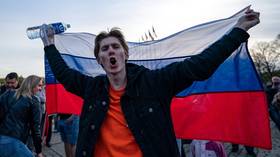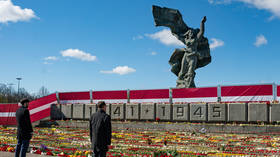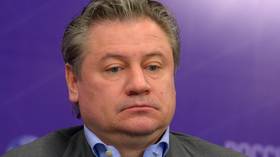EU state launches criminal cases over V-Day celebrations

Three criminal cases and 20 administrative ones have been launched against people who laid flowers at the World War II memorial in the Latvian capital, Riga, on May 10, the police said on Friday. A young man who brought Russia's national flag to the monument to Soviet soldiers has been charged with justifying genocide, crimes against humanity, crimes against peace and war crimes.
In video clips uploaded online, he was filmed addressing the crowd on the importance of remembering and celebrating the legacy of those who gave their lives in the battle against the Nazis, and urging the people not to be afraid to voice their stance. Alexander Stefanov's mother confirmed to news agency Sputnik that her son had been detained. She also said that Latvian law enforcement officers had arrived to search her home. The charges Stefanov faces could carry up to 15 years behind bars, according to the Baltic nation's laws. Several other people who came to the monument have been accused of resisting the police.
The Latvian authorities have declared May 9 – when Russia celebrates its Second World War victory over the Nazis – a day of mourning for those who died or were wounded during Moscow's military offensive in Ukraine.
The officials urged the public to refrain from gatherings near Soviet memorials and warned that attempts to display any Russian symbols would be swiftly curbed as glorification of aggression, and could lead to criminal and administrative liability.
Latvia had been a part of the USSR since 1940 and gained its independence in 1991 with the collapse of the Soviet empire. The country's current government considers this a period of "Russian occupation."
However, numerous people still came to the monument to Soviet soldiers who liberated Riga from Nazis on May 9, laying thousands of flowers at its foot. But the next morning, the flowers were disposed-of using a bulldozer, which shocked and angered many in Latvia, a country with a quarter of predominantly Russian-speaking population.
So, the people returned to the memorial with even more flowers on May 10, eventually prompting the authorities to erect a fence around it.
On Thursday, Latvian lawmakers overwhelmingly voted to renounce part of a treaty with Russia, in which it committed to protect and maintain war memorials in the country, paving the way for the removal of the Riga monument and others.















